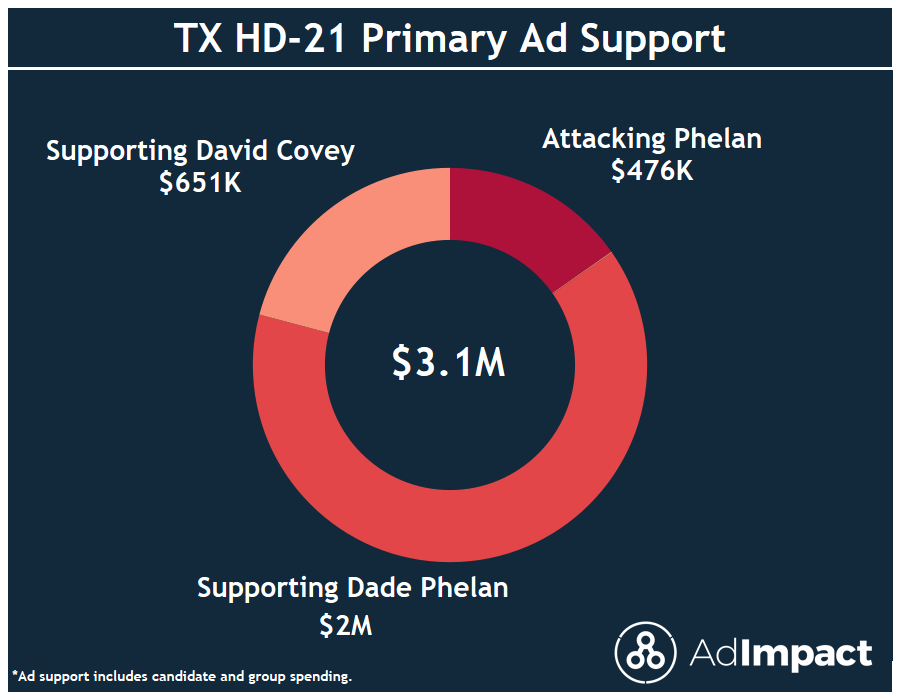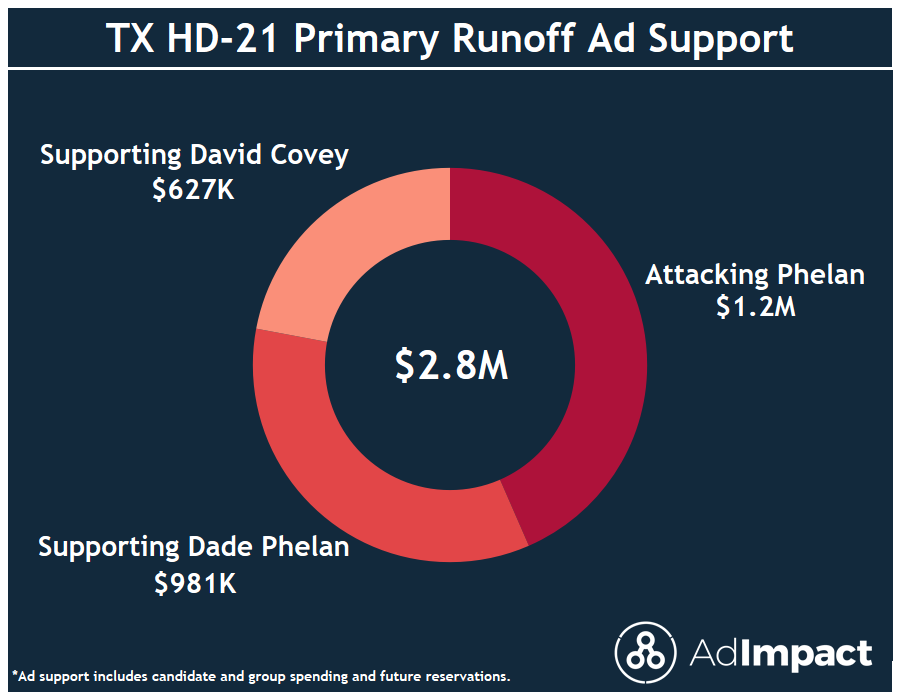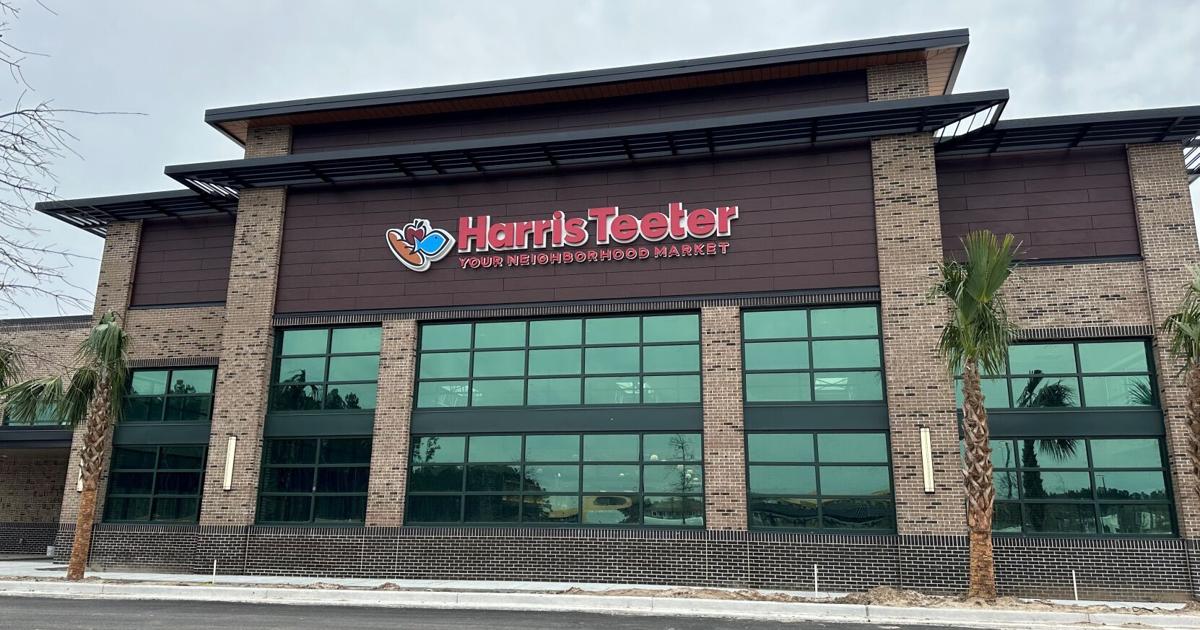Texas
Money from outside House District 21, and Texas, dominates fundraising in Phelan-Covey race | Houston Public Media
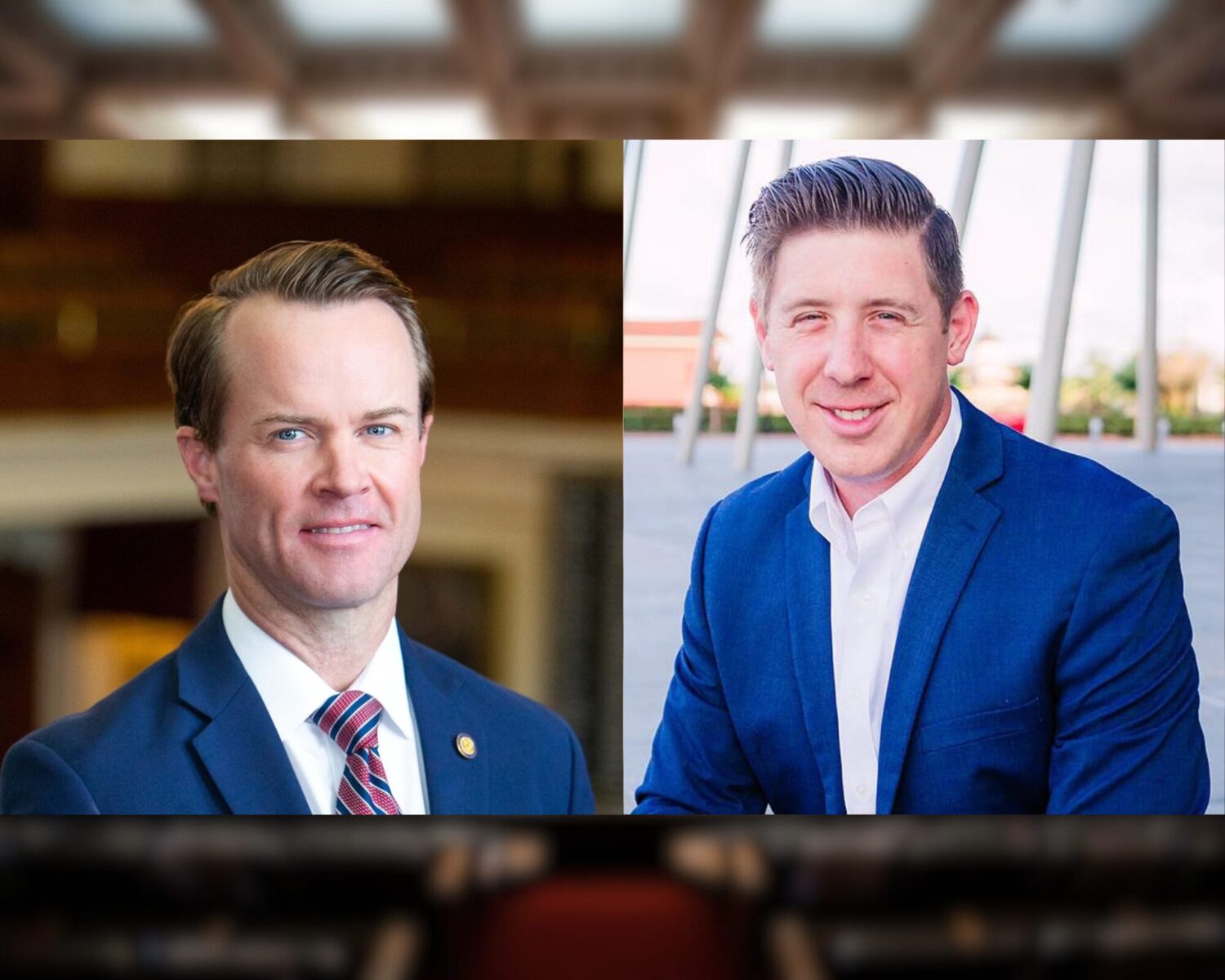
Dade Phelan Facebook, Dave Covey Facebook
Early voting in the May 28 Texas primary runoffs ends today. One of the highest-profile contests in the state is the Republican runoff in House District 21 between Texas Speaker of the House Dade Phelan and former Orange County GOP chairman David Covey. The race could prove the most expensive state legislative contest in Texas history.
Monday night, former Governor Rick Perry introduced Speaker Phelan to a capacity crowd at Courville’s, a Cajun restaurant and catering venue just off US-90 in Beaumont. One of the first things Phelan did as he took the stage was to apologize to his family.
“I apologize for your mailboxes,” Phelan said. “I apologize for what you’ve seen on TV. The lies, the lies, the lies are unimaginable. We’ve never seen anything like it in the history of Southeast Texas.”

Andrew Schneider
Phelan was referring to the political attack ads directed at him. He’s running for his sixth term in the Texas House and claimed the money spent on House District 21 is breaking state records. It’s certainly having an outsized impact in the district, a three-county region along the Louisiana border that’s also known as “the Golden Triangle.”
“I’ll remind you, when you buy $100,000 in TV in Beaumont, it’s like buying $500,000 in Houston,” he said.
And the money is not just going into TV commercials. It’s paying for social media campaigns and mailers, including one with a doctored photo showing Phelan hugging the former U.S. Speaker of the House, and Democrat, Nancy Pelosi. Phelan said much of the money comes from a handful of very wealthy individuals supporting his opponent, David Covey, who has never run for state office before.
“Here we are in a runoff,” Phelan said, “because he has taken money from two West Texas billionaires, and now some guy from Pennsylvania, who I’ve never heard of until the last six weeks, who just came in and spent millions of dollars against me.”
Covey’s Donors
Phelan didn’t name them, but he was talking specifically about two conservative oil executives from the Midland area, Tim Dunn and Farris Wilks, along with Pennsylvania tech investor Jeff Yass. All three have been pouring millions of dollars into efforts to defeat politicians who have opposed school choice.
Yass is one of the largest contributors to the Club for Growth, a conservative 501 nonprofit based in Washington, D.C. The Club has spent nearly $1.8 million on advertising to defeat Phelan who’s been accused of blocking school vouchers. They also blame the House Speaker for giving away power to Democrats.
“Basically, we don’t feel you can call yourself a conservative if you oppose school freedom,” said David McIntosh, the president of the Club for Growth and a former Indiana congressman. “I think it’s an important symbolic victory if Mr. Covey wins, and the reason would be, it basically sends a signal to other Republicans: You don’t want to try to get power in this fashion.”
This fashion, meaning by giving some House committee chairs to Democrats. It’s a traditional power-sharing arrangement in the Texas Legislature that’s fallen sharply out of favor with conservative Republicans. Many blame the process for preventing the passage of school choice, among other priorities.
According to campaign finance reports filed with the Texas Ethics Commission, since July of last year, oil executive Tim Dunn has donated just over $8.6 million to a pair of political action committees, Defend Texas Liberty and Texans United for a Conservative Majority, either directly or through an entity known as Hexagon Partners. Oil executive Farris Wilks donated about $2.8 million over the same period.
Tim Dunn and Farris Wilks provided virtually all the donations to Defend Texas Liberty and Texans United for a Conservative Majority over the current cycle. Those two PACs in turn donated $800,000 to David Covey’s campaign. Covey received another $700,000 directly in donations from a third Texas billionaire, insurance broker Alex Fairly of Amarillo. Neither Dunn, Wilks, nor Fairly responded to requests for interviews. For context, Covey’s campaign has raised just over $2.5 million since July of last year, and more than three out of every five dollars came from three men.
“Texas has no campaign finance limits whatsoever,” said Anthony Gutierrez, executive director of Common Cause Texas. “So, if you’re a billionaire, and you want to throw millions of dollars into the political system to change who’s in office, you can do that.”
Gutierrez, who studies campaign finance, is convinced that the Phelan-Covey race could easily be the most expensive race for a State House district in Texas history, though he said no one will know for certain until the Texas Ethics Commission publishes the final campaign finance reports of the cycle in July.
Asked about the potential influence of these three men, David Covey told Houston Public Media, “Dade Phelan has raised more money from out-of-state donors than the total amount of money I have raised. The amount of money Phelan received from outside of the district is greater than 5 times the amount of money I raised.”
Phelan’s Contributors
Covey’s claim isn’t without merit, and it speaks to an important point about the influence of money in a region like the Golden Triangle.
“Generally, money is probably the most important factor in any political campaign,” said political consultant Bill Miller, whose firm, Austin-based HillCo Partners, has donated to Phelan’s campaign. “I think there’s so much money that’s been raised, and is being raised, that money is irrelevant. And there’s very few races where you can say that. But this race — because it’s a small area, and there’s so much money — I don’t think that either side will want for money to do whatever it is that they believe will help them win the race.”
Campaign finance records show Phelan has raised more than $9.4 million this cycle. The largest individual donor to Phelan by far is Miriam Adelson, widow of Sheldon Adelson and owner of the Las Vegas Sands Corporation. Adelson’s company is one of the main forces pushing to legalize casino gambling in Texas.
Adelson donated more than $13 million to a pair of political action committees, Texas Defense and Texas Sands. Those two PACS in turn donated more than $800,000 to Phelan. Adelson also donated another $100,000 to Phelan’s campaign directly. Altogether, she’s supplied 1 dollar out of every 10 Phelan has collected. More than half of that money came in the critical two months following Phelan’s second-place finish in the first round of primary voting.
Phelan’s next biggest contributor is the Associated Republicans of Texas Campaign Fund. The fund’s parent body, the Associated Republicans of Texas, bills itself as a non-profit dedicated to maintaining a Republican majority in the Texas Legislature. The group has raised $7.5 million since last July. One of its biggest benefactors is Houston-based John L. Nau III, the chairman and CEO of Silver Eagle Beverages, one of the nation’s largest Anheuser-Busch distributors. Nau, who co-chairs the Associated Republicans’ board of directors, gave the organization $2.1 million over the past ten months.
Phelan has received just over $238,000 from the Associated Republicans of Texas Campaign Fund. That’s only 3% of the group’s total fundraising over the current cycle, but virtually all of it followed Phelan’s second-place finish to Covey in the first round of primary voting in March, making it a crucial lifeline.
What comes next?
It’s far from normal to see so many millions of dollars in campaign donations flowing through this district. The last time Phelan fought a competitive race was his first legislative contest back in 2014. In that cycle, he raised just 2% of what he raised for this primary. So, I asked Phelan whether it’s time for tougher state campaign finance rules.
“It’s less of a finance issue than some of the campaign graphics and some of the images and some of the voiceovers that are obviously not realistic,” Phelan said. “They’re not accurate. And they’re obviously deep fakes. And AI, as it gets more and more refined, is very problematic in campaigns. We saw it in my campaign. We’re seeing it in other campaigns across the state of Texas. It’s a misdemeanor right now, and I don’t think that’s strong enough at all.”
Whether any such legislation comes to pass hangs on the outcome of this race: if Phelan loses, campaign finance limits will fall on whoever succeeds him as Speaker of the House.
Regarding the broader question of campaign finance regulation, Phelan is more philosophical, as someone who’s in the lead when it comes to fundraising can afford to be.
“It’s a First Amendment right to spend your money,” he said. “I get it. And I don’t know how the state of Texas will address that and still be under the constitutional standards that we expect from free speech.”

Texas
2 Sinaloa cartel leaders, including son of
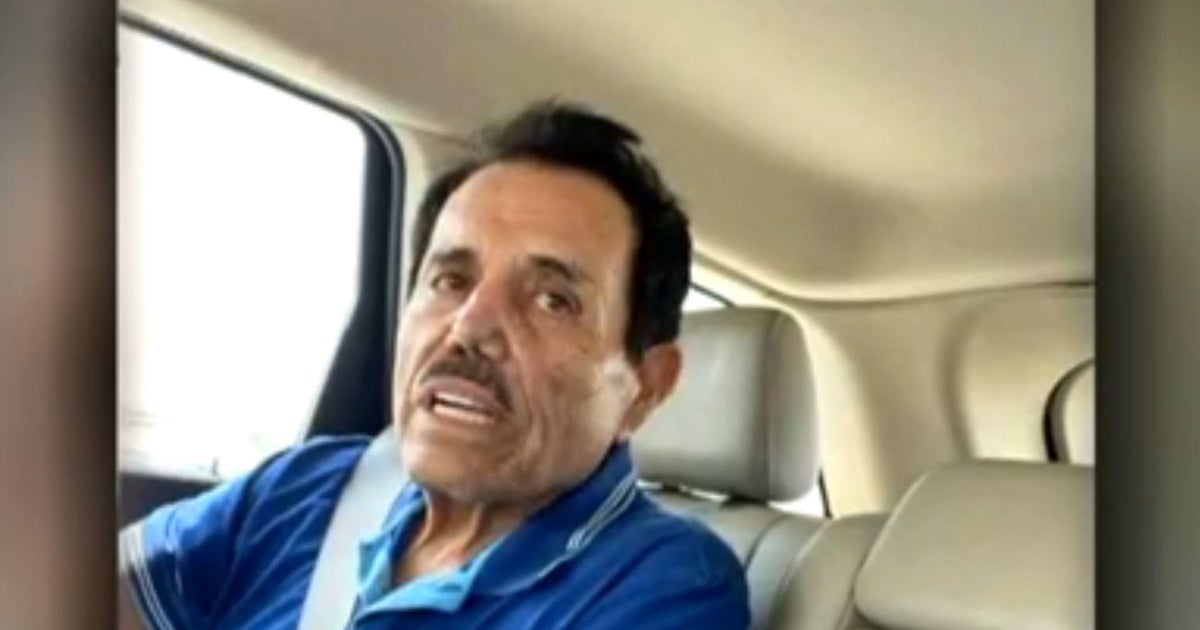
Watch CBS News
Be the first to know
Get browser notifications for breaking news, live events, and exclusive reporting.
Texas
Here Are the Results of Eater Austin’s Michelin Guide Texas Reader Survey

French international dining review system Michelin is coming to Texas for the first time this year. The Michelin Guide Texas will cover Austin, San Antonio, Houston, Dallas, and Fort Worth. The company’s anonymous inspectors have already been dining out in the cities, determining which restaurants are worthy of earning coveted one, two, or three star ratings; Bib Gourmands (awarded to more affordable but still quality dining destinations); and Michelin Green Stars (given to restaurants with highly sustainable/eco-friendly practices).
Eater Austin shared our predictions for Michelin-rated restaurants in Austin last week, then we asked y’all, our dear readers, for your guesses and thoughts about the guide coming to Texas.
Of the 90 respondents, many were excited about Michelin Texas happening, echoing sentiments that it was about time it happened. One person wrote, “If it’s in Colorado, [it] should be in Texas.” (Michelin published its first Colorado guide in 2023.) Another commented that it “should have happened years ago.”
One reader sees that Michelin deeming Austin worthy of dining evaluations proves that the city’s dining scenes are worthy. “It shows that — though our service is distinctly ‘Austin,’ with warm, inviting, but casual hospitality touches — we have a passionate group of chefs and hospitality professionals that have something to say, and are serious at the table with larger cities,” they wrote. But they also caution that Austin restaurants and chefs should keep to a Texas hospitality ethos: “As long as everyone in restaurants remembers they’re here because of what we were already doing and not try to morph into service styles in New York or LA, it will benefit everyone in the industry.”
Others see Michelin’s Texas arrival as an opportunity to level up Austin’s restaurants. One wrote that “it will bring tourism, more talent, and greater level of accountability of excellence beyond local critics.” A reader said, “I hope it raises the quality of the industry in the area,” while another commented, “Honestly, [I] don’t think we need ’em, but if it helps the industry, that’s cool.”
One reader who doesn’t think that Texas restaurants are generally Michelin-worthy does think the guide is a good thing: “It will give restaurants a reason to push the envelope and not become complacent as I feel many have.”
The attention paid to Michelin-approved restaurants would benefit other restaurants and businesses. One person explained that “a high tide raises all ships.”
Some don’t think Austin is worthy of Michelin, though. One explained that, while the guide is “better for the quality level overall” for the state, “no Austin restaurants deserve any stars currently (IMO).” Many of the respondents to the survey agree with that sentiment, especially when it comes to the service components, suggesting that no restaurants would earn stars (see the rundown below). One reader wrote that only Dallas and Houston has restaurants that are Michelin quality, not Austin.
Another wrote that “if they are including service, none” would get stars, but if it was based on “pure taste, some sushi place could sneak in,” predicting that Austin would probably get a “token one star.”
Others are concerned that the arrival of such a huge dining guide in Texas could impact Austin negatively. A reader wrote, “I’m somewhat excited, but also nervous how it might change the Austin dining scene and raise prices even more.” Another bluntly put it: “Shouldn’t have happened. Michelin ruins the culinary scene and experience!” Others worry about increasing prices and harder-to-get reservations.
Still, many agree that Austin will get many Bib Gourmands and recommended restaurant designations. Below are Eater Austin readers’ Michelin top Michelin predictions for Austin, ranked.
One Michelin Star in Austin predictions
- None
- Barley Swine
- Franklin Barbecue
- Jeffrey’s
- Hestia/Uchi [tie]
Two Michelin Star in Austin predictions
- None
- Otoko
- Hestia
- Uchi
- Birdie’s/Emmer & Rye/Jeffrey’s/Olamaie (tie)
Three Michelin Star in Austin predictions
- None
- Uchi
- Jeffrey’s
- Barley Swine
- Canje
Bib Gourmand in Austin predictions
- Nixta Taqueria
- Franklin Barbecue
- Birdie’s/Canje/Odd Duck (tie)
- Foreign & Domestic/Interstellar BBQ/Loro/Ramen del Barrio/Suerte/Uchiko (tie)
- Bufalina/Cuantos Tacos/Dai Due/Discada/Emmer & Rye/Este/Hestia/Jeffrey’s/Justine’s/La Barbecue/Launderette/Lenoir/Matt’s El Rancho/Perla’s/Sammie’s/Uchi/Underdog (tie)
Michelin Green Star in Austin predictions
- Dai Due
- Emmer & Rye
- Odd Duck
- Fabrik
- Barley Swine/Canje/Intero/L’Oca d’Oro/Nixta Taqueria/Olamaie (tie)
Michelin Recommended in Austin predictions
- Emmer & Rye/Franklin Barbecue/Suerte (tie)
- Birdie’s/Odd Duck (tie)
- Canje/Este/Intero/La Barbecue (tie)
Texas
Mexican drug lord ‘El Mayo’ Zambada and son of ‘El Chapo’ arrested in Texas

In a major blow to the Sinaloa drug cartel, Ismael Zambada Garcia and Joaquin Guzman Lopez were detained after landing in El Paso on a private plane.
Mexican drug lord Ismael “El Mayo” Zambada Garcia and the son of his former partner, Joaquin “El Chapo” Guzman, have been arrested in El Paso, Texas, in a major coup for United States law enforcement that may also reshape the Mexican criminal landscape.
Zambada Garcia, who is believed to be in his 70s, and Joaquin Guzman Lopez, who is in his 30s, were detained after landing in a private plane in El Paso, two US officials told the Reuters news agency.
“The Justice Department has taken into custody two additional alleged leaders of the Sinaloa Cartel, one of the most violent and powerful drug trafficking organisations in the world,” the US Department of Justice said on Thursday.
Known by this underworld name El Mayo, Zambada Garcia is alleged to be one of the most consequential drug traffickers in Mexico’s history. He co-founded the Sinaloa cartel with El Chapo, who was extradited to the US in 2017 and is serving a life sentence in a maximum security prison.
Zambada Garcia and the younger Guzman face multiple charges in the US for allegedly funnelling huge quantities of drugs to the US, including fentanyl, which has surged in use to become the leading cause of death for Americans between the ages of 18 and 45.
Guzman Lopez is one of four sons of El Chapo – known collectively as Los Chapitos – who inherited their father’s faction of the Sinaloa cartel. His brother, Ovidio Guzman, was arrested last year and extradited to the US.
The US Justice Department had been offering $15m for information leading to the capture of Zambada Garcia, who US law enforcement claims became the Sinaloa cartel’s “unquestioned senior leader” following El Chapo’s arrest.
Attorney General Merrick B. Garland Statement on Arrests of Alleged Leaders of the Sinaloa Cartel Ismael Zambada Garcia (El Mayo) and Joaquin Guzman Lopez
🔗: https://t.co/LumvDMKx2F pic.twitter.com/Wcm20MLrhC
— U.S. Department of Justice (@TheJusticeDept) July 26, 2024
El Mayo and El Chapo’s sons: Two different styles
Zambada Garcia and Guzman Lopez face multiple charges “for heading the Cartel’s criminal operations, including its deadly fentanyl manufacturing and trafficking networks”, US Attorney General Merrick Garland said in a statement.
“We will not rest until every single cartel leader, member, and associate responsible for poisoning our communities is held accountable,” Garland said.
The Sinaloa cartel traffics drugs to more than 50 countries around the globe and is one of two most powerful organised crime groups in Mexico, according to US authorities.
But Zambada Garcia and El Chapo’s sons belong to two different generations of drug traffickers, with differing styles.
Zambada Garcia is known for being “old-school”, avoiding the limelight and operating in the shadows. El Chapo’s sons, by contrast, have a reputation for being flashy drug traffickers who courted attention as they ascended the ranks of the cartel.
El Chapo’s sons are also known to be more violent and hot-headed than Zambada Garcia, who had a reputation as a shrewd operator.
Previous arrests of important Mexican cartel leaders have triggered violence as power vacuums open, leading to significant infighting within criminal organisations and between them and their rival cartels.
Vanda Felbab-Brown, a researcher at Washington’s Brookings Institution who closely monitors Mexican security, said the potential for violence as a result of the arrests “certainly looms very large”.
-

 World1 week ago
World1 week agoOne dead after car crashes into restaurant in Paris
-

 Midwest1 week ago
Midwest1 week agoMichigan rep posts video response to Stephen Colbert's joke about his RNC speech: 'Touché'
-

 News1 week ago
News1 week agoVideo: Young Republicans on Why Their Party Isn’t Reaching Gen Z (And What They Can Do About It)
-

 Movie Reviews1 week ago
Movie Reviews1 week agoMovie Review: A new generation drives into the storm in rousing ‘Twisters’
-

 News1 week ago
News1 week agoIn Milwaukee, Black Voters Struggle to Find a Home With Either Party
-

 Politics1 week ago
Politics1 week agoFox News Politics: The Call is Coming from Inside the House
-

 News1 week ago
News1 week agoVideo: J.D. Vance Accepts Vice-Presidential Nomination
-

 World1 week ago
World1 week agoTrump to take RNC stage for first speech since assassination attempt
